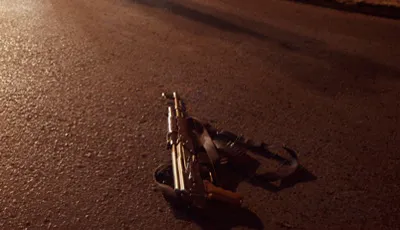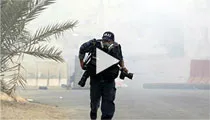Reporters can’t tell the public that organized crime has taken over a Mexican state. By Mike O’Connor

The Zacatecas Rules: Cartel’s Reign Cannot Be Covered
By Mike O’Connor
An anonymous phone call tipped police to the body dumped in a field near the hamlet of El Bordo in central Zacatecas state. Police would say only that the victim was a peasant farmer in his 40s who had been beaten and shot, and that his body had been there for a few days. But the reporter knew the pattern: A poor person in a rural community had not paid extortion money to the ruling cartel, or had somehow crossed the gang. Much more information was waiting in the hamlet, from family members and neighbors. But the reporter wasn’t going, though it was only an hour or so from the state capital where he worked. He could never write such a story. In fact, just learning what really happened would put his life in danger.

“They’ll kill you, and I have children. So, I guess even if you don’t think about it every time you write a story, you never forget about it, either,” the reporter said. “It must be there all the time, somewhere, always. Because you automatically know the things you can write about and the things you can’t say.”
These are the rules for reporters in the state of Zacatecas, Mexico.
What reporters can’t tell the public is that organized crime has taken over Zacatecas, from the deserts to the mountain ranges. Journalists told CPJ that gangs control each of the 58 counties either completely or almost so. In most of the state, they said, control is in the hands of the Zetas, the most vicious and feared cartel in Mexico. The municipal and state police, reporters said, are terrified or have been bought off. Some police stations are abandoned and others have officers who seldom leave the building. Beginning about a year ago, army, navy, and federal police patrols made the main highways somewhat safer, along with a very few rural areas, but the state does not belong to its citizens, journalists said.
In other states, the press has been forced into silence after the murders of journalists–sometimes, a stream of murders. But in Zacatecas, the cartels haven’t had to kill a single journalist to silence every journalist. According to CPJ research, this is the pattern now in many Mexican states: Cartels gain control, the press is intimidated, and the public is uninformed. And since there are no deaths among local journalists, there is no attention drawn to the pervasive problem of self-censorship.
“We know what organized crime does to reporters who don’t follow orders in other states. They kill them,” a journalist known for his bravery said on the patio of a bar near the state capitol. Speaking of a reporter murdered in January 2010 in the neighboring state of Coahuila, he added: “We knew Valentín Valdéz–he came here once. He sat at this table. Here, this very table. They killed him.”
There are two false but broadly held beliefs among the political and social elite in Mexico City. The first is that every reporter in the states is corrupt. The second is that murdered reporters were singled out because they worked for a cartel and had either angered their gang bosses or crossed a rival group. There is some truth in this broad caricature. CPJ research has found that corruption has tainted the press corps at times. That may happen because journalists want the extra money. But when a cartel of killers takes over your town and tells you to follow orders if you want to keep your family alive, well, corruption is not exactly the right description.
Still, this stereotype of the corrupt journalist has had the effect of absolving national leaders of their obligation to address the murderous attack on free expression across the country. Why protect the corrupt? Why investigate a journalist’s murder if everyone knows the victim was working for a cartel? So even as Mexico has taken important steps like the adoption of a constitutional amendment that federalizes anti-press crimes, it’s not going to make any real progress until its leaders understand that their cynical views are wrong.
They can go to Zacatecas to learn this.
There, journalists express a profound responsibility for their work and an anguish that it can no longer be done properly. Their torment comes spilling out in interviews across the state. In the city of Fresnillo, when CPJ met with a group of reporters, a veteran journalist was on the edge of tears. She stood, head down, chin nearly to her chest. Then she pulled her head up to speak to 12 other reporters, her suffering spread across her face. At first, she said, it was the personal frustration of knowing the reality and not being able to report it. Then, a deeper truth came out. “We have failed the people here who counted on us to tell them what was happening all around us. We had the responsibility to tell them, but we could not. So we failed them.” Some agreed with her. Others said that telling the truth was suicidal and that self-censorship was the only way to survive.
A lone reporter, too afraid to speak in public, came instead to a CPJ representative’s hotel room, where he collapsed in uncontrollable weeping, a trembling human ball in a corner chair. “These things chase me in my sleep,” he said. “Sometimes it feels physical because they pull you in two directions. You have to report what is happening. You must. But you can’t.”
CPJ spoke with 32 reporters, photographers, and editors in Zacatecas. Some of the editors hold senior positions for statewide papers; some of the reporters work for small-town broadcast stations or weeklies. All were told their identities would be kept confidential. All agreed that organized crime operates at will in every corner of the state, and that journalists saw the wave rolling across Zacatecas and were afraid to report it.
It’s strange, the things journalists can no longer report. Not only things like threats and payments to police and public officials–those wouldn’t be visible. But in the city of Fresnillo, the state’s largest, journalists said they all knew that one of Mexico’s top Zeta leaders often lived at 301 Huicot Avenue. Of course, they said, if journalists were on to it, then the city police knew, and so did the army and the navy, which are in the state supposedly doing what the police won’t do. The avenue is perhaps the city’s most high-end street, four lanes and pruned pine trees down the divider. The Zeta leader’s house was one of the newest.
Not a word of any of that was reported, journalists in Fresnillo said. Then, a murderous dispute exploded between the gang leader, known as Zeta 50, and a rival called Zeta 40. In the first week of September 2012, according to neighbors and reporters, construction machinery showed up at the home and partially demolished it–a humiliating public assault by Zeta 40 on Zeta 50. Afterward, debris from the Huicot Avenue home ran across the yard, onto the sidewalk, and into the street. But nothing about the event was reported. Even talking about it, reporters whispered. And those who work for statewide news organizations said they didn’t tell their editors in the city of Zacatecas, the capital, because they assumed their phones were tapped by either the Zetas or the authorities. In any event, even a story as obvious as this was much too dangerous to publish. (U.S.-trained Mexican marines arrested Zeta 50, identified as Ivan Velázquez Caballero, on murder charges in late September, Mexican officials said. Although half the city of Fresnillo knew where Zeta 50 was living, the tip that led to his arrest had come from Washington, according to a U.S. law enforcement official.)
The Zeta cartel began slithering into the state virtually unnoticed because there were few gunshots. About five years ago, a small force of midlevel cartel leaders arrived with magnificent SUVs, assault rifles, and thick rolls of pesos wrapped in rubber bands, according to reporters. The weapons and money were distributed to the young sons of impoverished bean and chili farmers; the payoffs made them important people in their isolated, scrub desert and mountain communities. These young men knew the canyons and the country trails far better than the soldiers and federal police sent from the outside to control them. Though they now exploit their own, they are also the sons of Zacatecas. As that was happening, there was a coup against the police in nearly every county. “It was very smart,” a reporter told CPJ. “They went to the local police chiefs and the local, small-time criminal gangs and said, ‘We’re here and we’re in charge.’ Some of the police were killed, just to make a climate of terror. It was for an example. Then the rest went over to the cartel.”
Zacatecas has only about 1.5 million residents. But it’s just about in the middle of the country, so major highways–the drug routes to the North–run through it. Since it is mostly empty, it is also a very good place to train, hide, and then dispatch cartel soldiers in any direction they’re needed. And 1.5 million people with little police protection still represent a good opportunity for drug sales, robbery, extortion, and kidnapping.
Mexicans hardly ever see a thing about this state in their press, except its gorgeous colonial buildings and museums. Mexico is a country of 112 million, making Zacatecas barely worth counting amid the crime and death occurring nationally. And with more than 50 journalists and media workers killed or disappeared nationwide since 2007, Zacatecas would not seem to register as a press freedom concern. But that would miss two important facts. There isn’t as much bloodshed in Zacatecas precisely because the Zetas have so much control. Despite a split in the cartel and firefights with other gangs nibbling at the edges of the state, the Zetas’ lock is strong.
The other factor is this: While there are correspondents from national news organizations based in Zacatecas, they can’t report the truth either. They are no safer than the local press, and they work under local rules. Even if correspondents were foolhardy enough to file stories that gave a true picture of what happened at the beginning of the Zetas’ takeover and what is happening today, editors in Mexico City tell CPJ, they won’t publish stories that will put their correspondents’ lives in danger. So the Mexican public as a whole has been kept in the dark about Zacatecas. The state has been taken over by homicidal gangsters, and people who rely on the Mexican national press still don’t know.
“We had to decide to take a step back from giving a full view of the national picture,” said Mireya Cuéllar, national editor of the newspaper La Jornada. “I would definitely call it a step back. That’s a very clear decision because no story is worth the life of one of our correspondents. Our people who cover the states live there and their families are there. They are very vulnerable.” The larger issue, then, isn’t just about one small state but rather how many other, seemingly quiet states are really just like Zacatecas?
Since the journalists of Zacatecas were not able to tell the public about the cartel takeover, they were not able to expose the state government’s failures either. “The fact is that the criminals got in and the state government should have been watching,” state legislator Saúl Monreal said. “Why it wasn’t watching is what we all want to know. Because now these guys are everywhere and no one knows how to handle them. The state government is completely overwhelmed.” Running his hand above his head, as if to show the government drowning, he added: “Now, were the state officials only inept? That’s very inept. Were they threatened also? Did some get payoffs? We don’t know.”
Journalists said they can’t get to the bottom of what went wrong originally for the same reason they can’t find out if state officials are involved with the problem today: The cartels are too dangerous to even ask about. There is some limited coverage of the gunfights between cartels, and those between government forces and cartels. That’s spot news, stories about an event, not stories that give readers a panoramic view of what is going on. But almost always, reporters said, it’s either too dangerous to get close to the fighting or, more likely, government forces seal off the area.
The result is that most news stories have to be written from what the state or federal government claims happened. And that’s where reporters learn not to ask questions. A reporter explained: “If I call a police official and push for too much information about a shootout, then he begins to give me subtle threats, like ‘Why are you so curious?’ In Zacatecas, that’s a threat.” Another reporter said, “Maybe I could go to the county records department to research how much a legislator’s suspicious new house cost. But a clerk will report me, I’ll have to leave my name, somehow it will get out. Why don’t I just shoot myself instead? That will be quicker.”
It is not just the cartels that keep the news from the public, according to reporters and top editors. Their own news organizations are afraid to lose vital advertising contracts from the state, and the official state policy has been that there was no problem with the cartels. Zacatecas’ economy is fairly simple. It has mines and farms, some tourism, and money sent back by relatives working in the United States. It is hard for any news organization to find substantial advertisers. “Most of us survive only because of what the state pays for ads,” said the publisher of a major newspaper. An editor said: “There is no doubt that makes the owner listen to what the state says. If the governor calls the owner and says such and such is the truth–well, you better take that into account.” Two governors ago, when reporters said the Zetas were beginning to arrive, the governor’s position was that there was no problem. The current governor says there’s a problem but it’s being handled.
Jerez is a little town founded in the 1500s. Its sidewalks are framed by high stone arches, and its plazas are surrounded by wrought ironwork and green ivy. Not only does nearly everyone know each other, nearly everyone’s great-great-grandmother knew everyone else’s. Its small stores were left open when shopkeepers went to lunch, and bicycles were left leaning unlocked against lampposts. That was until three years ago, people said, when the spread of the Zeta cartel reached the rural settlements around Jerez and then the town itself. Now, Jerez is noteworthy for its terror. There were no news stories about it, journalists here said.
A woman in her 50s said she had moved away for university and a career, and came back for her hometown’s quiet ways and to care for her elderly parents. “Just don’t put down my name,” she said, taking a careful look around. “The nights used to be nearly as lively as the days because we lived in the plazas and walked from one friend’s home over to a cousin’s or things like that. There were musicians who came on a route they had from other towns.” Not now. Those nights are gone. The streets are quiet before dark. Friends don’t get into details with one another, people said. Everyone feels the terror alone, or maybe they share it with their closest family members. “I heard that they were extorting the taxis on the main plaza and my cousin has a taxi there,” a man said. “My cousin wouldn’t say yes and he wouldn’t say no. That means yes. They steal our money first, then they steal the life we had together.” Until recently, a family in Jerez would be proud to say they had relatives in the United States who were doing well. Now, no one wants it to get out that their relatives in the north may be better off than broke because that could mean a nasty visit from a group of Zetas demanding a monthly payment.
In their new isolation from the friends and families they have known for generations, the people of Jerez are also isolated from the truth about the rest of the state. In their own small town, they learn only guarded rumors of what might be happening. They cannot see how their lives sync up with other lives in other towns and in the vast, wild stretches in between.
The highway from Jerez to the state capital is four lanes and is sometimes patrolled by the army. It takes about an hour for the run. People on both ends said that in early 2012 the Zetas routinely set up roadblocks and stole cars or robbed people in buses. It was the Old West of the U.S. come south. Journalists said it was like that all around the state, although the military has more or less retaken the major highways. The trouble is that the state is all open space with just slivers of pavement. Even if the federal government did have control of the highways, it wouldn’t have control of Zacatecas.
On the way back from Jerez to the capital, along the right side of the highway, close, maybe 250 feet away on a hard dirt road, there were two SUVs with civilians carrying assault rifles. They were on patrol, covering their zone.
Mike O’Connor is CPJ’s Mexico representative. He is the co-author of CPJ’s 2010 report, Silence or Death in Mexico’s Press.

